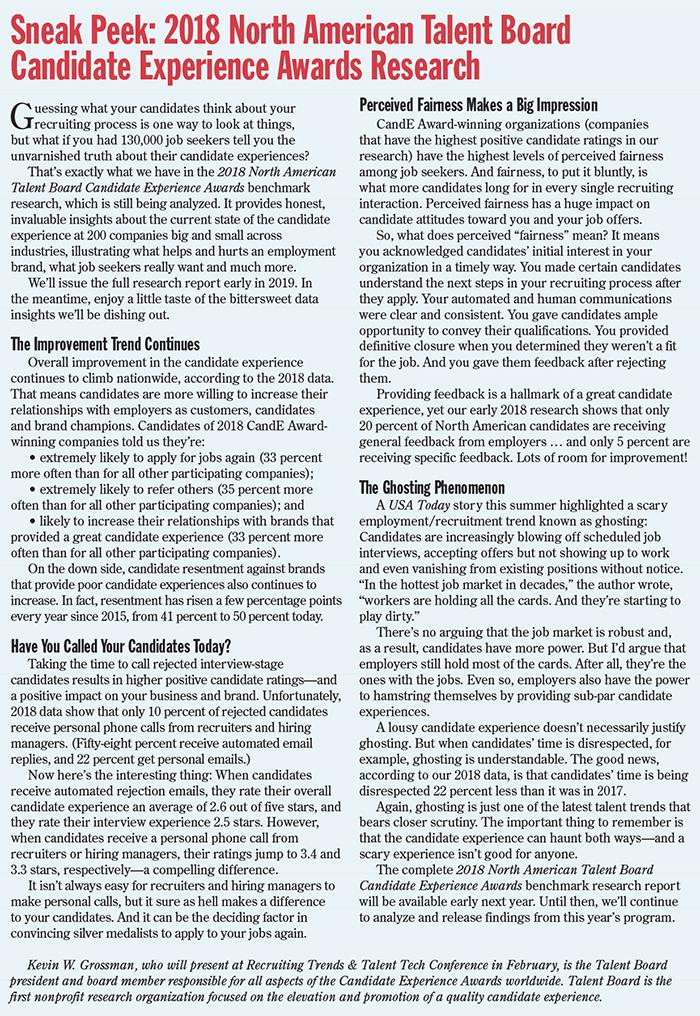It may be the age of the internet, but the phone still reigns supreme when it comes to engaging candidates, especially for high-level positions. That’s according to Conni LaDouceur, who brings decades of executive-search experience to the table–first at Heidrick & Struggles and then at her own firm, EQC Talent Sourcing Experts. She’ll be presenting at the upcoming Recruiting Trends & Talent Tech Conference this February in Las Vegas.
That’s not to say that other, newer tools are any less important than the phone. In fact, LaDouceur, whose session is titled “Do This, Not That: Talent Sourcing for Speed and Success,” says recruiters need to combine phone sourcing with the efficient use of web-sourcing strategies to identify not just the talent that’s most easily found, but the talent that’s the most qualified for the position they’re trying to fill. In her session, LaDouceur will talk about the free tools recruiters can use to source talent and how neuro-linguistic programming can help assess and identify top talent effectively.
We recently caught up with LaDouceur to get her take on the most effective ways to find and engage top candidates and what she likes most about her job.
Are there some recent recruiting developments you’re excited about?

Well, it’s not a recent development, but there’s a software tool called Yesware that’s really interesting. It enables us to see when an email is opened so we can immediately pick up the phone and say to the person, “I see you’re opening up the email right now, I’d love to talk to you.” We get to know immediately when an email is opened. It’s improved our ability to connect with people.
Isn’t that a bit intrusive?
Well, the point you just made gets to several other points of the question, and that is that people just aren’t picking up the phone to the extent that recruiting requires. Recruiting is outreach; it implies you’re reaching out to bring someone who has the qualifications for a given role on board. In our case, as a sourcing company, and a longstanding sourcing company with expert professionals, we’re relied upon to fill challenging engagements–to find candidates for positions that, in some cases, companies haven’t been able to fill for years, even after posting on a variety of different sites. We do that by using fantastic tools supplemented by telephone outreach. We use the phone to identify who’s in the role now, how many people the person manages–you can’t determine these things just by the person’s title. Now, some people may find this method intrusive, but what I can tell you is that candidates have come back to us when their department has a need to fill because they found that we’re professional and persistent. We’re excited about every new tool or method that comes down the pike until we try it. They’re disappointing largely because the types of engagements for which we hire are so specific that the various tools that are popular in sourcing right now just can’t help us.
What are some recent roles that you’ve filled?
We just filled a position at a major chemical company, a probiotic design scientist, that was open for two years. We filled a position for vice president of special collections at a major research library, a position at Georgetown University and we just finished an engagement to find a compensation analyst for one of the world’s largest financial-services advisory firms. We’ve filled a wide variety of roles in a bunch of different industries–we’ve filled positions for gold-mining companies in South America, we’ve found specialists in laying undersea cable, we’ve called into trailers in the oil sands of Alberta.
Can you share some of your secrets for finding great talent?
I guess it begins with our strategic checklist for research: We ask clients 33 questions, 20 of which are used for identifying the qualifications that candidates must have, and others for identifying the nice-to-haves. You want to find out how many people the person will be managing and the companies where the client wants to hire from.
We help our clients determine who the best performers are in a particular industry. We actually do that by working with research libraries. If we’re trying to find a candidate working in software development, for example, we call the San Jose Public Library. There are a lot of independent directories that list org charts and executives, and it’s important to at least avail yourself of this information … rather than relying solely on LinkedIn, where you only find out what people choose to write about themselves.
Once we’ve identified the 10 people we feel are the best candidates for the role, we call in to their companies to identify their peers, who they report to, how many people they manage and who’s next in command. All of this information is important because if it turns out the actual candidate is making more in salary than the client had anticipated, we can go back to the client to decide whether they still want to pursue this person or whether they want to look at the person’s second-in-command, who may have the potential the client is looking for. If the candidate isn’t interested in the role or can’t relocate at this time, we make sure to obtain their recommendations. And we never directly say, “Can you recommend someone?” Instead, we thank them for sharing all that they did about their background and say, “Let’s talk about the people you know who might be qualified for this role. Is it the person who hired you or interviewed you? Who’s the best manager you ever worked for?” We have 20 questions we walk people through. In this line of work, it’s important, above all, to do the three Ps: politeness, professionalism and perseverance.
Where do you think recruiters fall short today in their approaches to finding and attracting great candidates?
I think so many are just reluctant to pick up the phone. There’s so much information that’s available just for the asking. I’m not against texting–we absolutely want to avail ourselves of all the tools we can–however, picking up the phone to identify a person’s entire team before you reach out to them can reveal so much. I’ve seen stats that 80 percent of recruiters stop trying to reach someone after the third phone call. Well, of course candidates are busy; they’re gainfully employed high performers, so you have to turn their heads. If you’ve called eight times and you’re not getting a response, then you have to modify your message to something like, “I know you’re not interested in looking at opportunities right now, but I want you to know just what you’re saying no to.” Some people will call us back and say, “Enough already,” and we’ll say, “Let’s talk for just a minute.”
Which skills do you believe are must-haves for recruiters?
I think personality leads to a great recruiter and it’s not going to be whether the person’s an extrovert or an introvert, it’s whether they have curiosity and a competitive nature. For me, I never want to fail, and I always want to meet or exceed the client’s expectations. As for skills, I think the ability to use the phone to uncover information is a great skill to have because there’s just so much information out there waiting to be unveiled.
What is the most rewarding part of working in this field?
It’s finding the qualified talent that the client didn’t know about, finding and bringing to the table the talent the client told us they were most interested in.
The beauty of this job is that it’s like what Walt Disney said: It’s fun to do what others think is impossible. We get to work in all kinds of industries, and I love learning about who the movers and shakers are and what makes everyone tick. It’s fantastic and it’s fun.
The 2019 Recruiting Trends & Talent Tech LIVE will be held Feb. 20 through 22 at Caesars Palace in Las Vegas. Go to www.RecruitingTrendsConf.com to learn more about program, exposition and networking opportunities.

